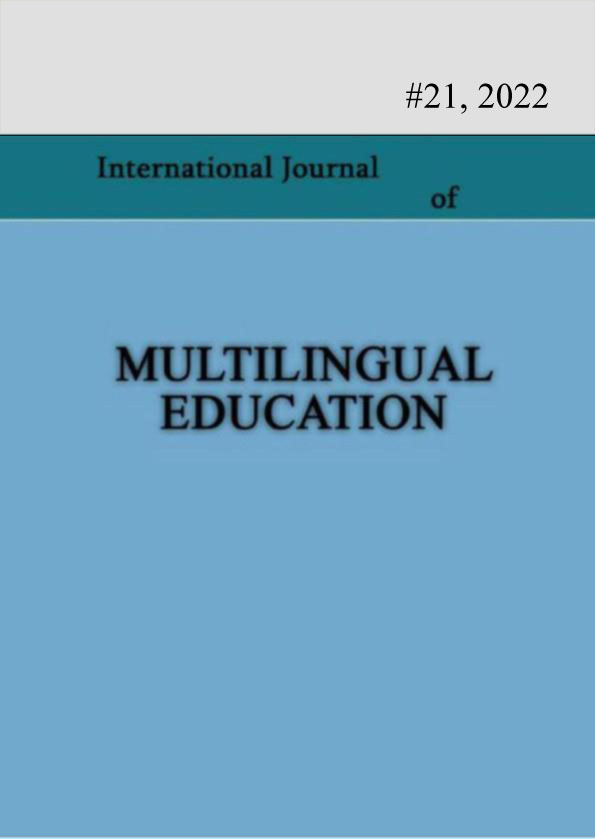Several aspects of the phenomenon of interference in the teaching of the Georgian language
Keywords:
Second language teaching; interference, Language contacts, second language teachingAbstract
Several peculiarities appear in the process of teaching the Georgian language to Azerbaijanis, which are caused by the structural and typological differences between the Georgian and Azerbaijani languages.
In the process of teaching the Georgian language, it is necessary to take into account the peculiarities of the phonetic, morphological and syntactic structures of the Azerbaijani language, because often linguistic interference becomes an obstacle to communication in the second language.
References
Akhvlediani, G. (1999). გ. ახვლეdიანი, ზოგაdი ფონეტიკის საფუძვლები [Akhvledian, G. basics of general phonetics]; Tbilisi.
Azerian grammar, (1971). Грамматика азербайджанского языка (фонетика, морфология и синтаксис) [Grammatica of the Azerbaijani language (phonetics, morphology and syntax), Editors: Shiraliev M. Sh., Sevortyan E. В.— Baku]: https://altaica.ru/LIBRARY/ turks/ azerigrammar. pdf
Baker C. (2010). Baker C., Foundations of Bilingual Education and Bilingualism; Multilingual Matters LTD; Clevedon-Buffalo-Toronto-Sydney.
Baliashvili, T. (1988). თ. ბალიაშვილი, ინტერფერენცია, როგორც ბილინგვიზმის პრობლემა [Baliashvili, T. Interference as a problem of bilingualism], Tbilisi,
Beridze T. (2022). თ. ბერიძე, ინტერფერენციის მოვლენა ქართველ-ბერძენი ორენოვანი უმცროსკლასელების ნარატივებში; [Beridze, T. the phenomenon of interference in the narratives of Georgian-Greek bilingual junior high school students]; Tbilisi.
Chikobava, A. (1968). არნ. ჩიქობავა, მარტივი წინაdაdების პრობლემა ქართულში, [Chikobava A., Simple sentence problem in Georgian, Tbilisi.
Corder S. (1967). Corder, S. P. The significance of learners’ errors. International Review of Applied Linguistics, 5(4): 161 –70.
Doerfer, G. (1988). G. Doerfer, Azeri Turkish: Encyclopaedia Iranica, Vol. III. https://iranicaonline.org/articles/azerbaijan-viii, Last Updated: August 18, 2011 Ferguson, C. (1971). Ferguson, C. A. Absence of copula and the notion of simplicity: a study of normal speech, baby talk, foreigner talk and pidgins. In D. Hymes (ed.), Pidginization and Creolization of Languages (pp. 141 –50). Cambridge: Cambridge University Press.
Gabunia K. (2014). კ. გაბუნია, ზმნა-შემასმენლის კონსტრუქციების სწავლების სპეციფიკა არაქართულენოვანი შემსწავლელებისთვის [Gabunia K., the specifics of teaching verb-listener constructions for non-Georgian language learners: humanitarian studies; Yearbook #5], TSU Publishing House, Tbilisi.
Gabunia K. 2016 : კ. გაბუნია, მარტივი წინაdაdების ანალიზის პრინციპები თანამედროვე ქართულში [Gabunia K., Principles of Simple Sentence Analysis in Modern Georgian], Saimedo, Tbilisi.
Gabunia K. at al., (2008). კ. გაბუნია, შ. ტაბატაძე, ნ. ფერაძე, ჭ. ქირია, მ. ოძელი, მულტილინგვურ განათლებასთან dაკავშირებულ ტერმინთა თარგმნით-განმარტებითი ლექსიკონი. საქართველოს განათლებისა და მეცნიერების სამინისტრო. ქართული ენის სამსახური [Gabunia K., Tabatadze, Sh., Feradze N., Kiria Ch., Odzeli M., A translation-explanatory dictionary of terms related to multilingual education. Ministry of Education and Science of Georgia]. Tbilisi,
Gajieva, N. Z. (1997). Н. З. Гаджиева, Тюркские языки, Языки мира [N. Z. Gadzhieva, Turkish languages, World languages]; Moscow.
Jangidze, V. (1967). ვ. ჯანგიძე, ქართული ნასესხობანი აზერბაიჯანულ ენაში [Jangidze, V. Georgian loanwords in the Azerbaijani language: TSU works, vol. 118, https://www.duhoctrungquoc.vn/wiki/ru/%D0%90%D0%B7% D0%B5%D1%80%D0%B1%D0%B0%D0%B9%D0%B4%D0%B6%D0%B0%D0%BD% D1%81% D0%BA%D0%B8%D0%B9_%D1%8F%D0%B7%D1%8B%D0%BA
JIkia S. (1957). С. Джикия, О грузинско-азербайджанских языковых взаймоотношениях [Dzhikia S., about Georgian-Azerbaijani linguistic mutual terms]: Proceedings of the Institute of Linguistics, Oriental Languages Series, Vol. 2, Tbilisi,
Kurdadze, R. (2011). რ. ქურdაძე, თანამეdროვე ქართული ენის სოციალურ-კულტურული ასპექტები [Kurdadze, R., Socio-cultural aspects of the modern Georgian language], TSU Publishing House. Tbilisi.
Kvachadze, L. (2010). ლ. კვაჭაძე, თანამეdროვე ქართული ენის სინტაქსი [Kvatchadze, L. Syntax of the Modern Georgian Language], Tbilisi.
Melikishvili D. (1978). d. მელიქიშვილი, „მიჭირს“ ზმნა dა მასწავლებლის გასაჭირი. [Melikishvili, D., the verb "I'm in trouble" and the teacher's predicament: Georgian language and literature at school. 1978. Tbilisi, 4, 81-93.
Memarnishvili E. (2022). ე. მემარნიშვილი, ქართულის, როგორც მეორე ენის სწავლების თეორიულ-პრაქტიკული ასპექტები (გარdამავალი ზმნის სინტაქსური კონსტრუქციების მაგალითზე), სამაგისტრო ნაშრომი, თბილისი.
Odlin T. (1993). T. Odlin, Language Transfer: Cross-linguistic Influence in Language Learning Cambridge, CUP,1993.
Rukhadze, L. (2013). ლ. რუხაძე, თურქული ნასესხობები ქართულ სალიტერატურო ენაში, [Rukhadze L., Turkish borrowings in the Georgian literary language], Tbilisi.
Saville-Troike M. (2012). Muriel Saville-Troike, Introducing Second Language Acquisition: Cambridge University Press; 2 nd Revised ed. Edition.
Selinker L. (1992). Selinker, L., Rediscovering Interlanguage. London.
Shanidze, A. (1942). ა. შანიძე, ქართული ენის გრამატიკის საფუძვლები [A. Shanidze, Basics of Georgian Grammar], Tbilisi
Sharaliev M.S. (1997). М. Ш. Ширалиев, Азербайджанский язык [Shiraliev M. Sh., Azerbaijan language: World language, Turkish languages, Moscow.
Weinreich, U. (1953). U. Weinreich, Languages in Contact. The Hague: Mouton.
Published
How to Cite
Issue
Section
License
Copyright (c) 2022 Kakha Gabunia, Elisabed Machitidze

This work is licensed under a Creative Commons Attribution-NonCommercial 4.0 International License.
Copyright (c) - Authors who publish with this journal agree to the following terms: Authors retain copyright and grant the journal the right of first publication with the work simultaneously licensed under a Creative Commons Attribution-Noncommercial 4.0 International License, which allows others to share the work with an acknowledgement of the work's authorship and initial publication in this journal. Authors are permitted and encouraged to post their work online (e.g., in institutional repositories or on their personal website) prior to and during the submission process, as it can lead to productive exchanges, as well as earlier and greater citation of published work (see The Effect of Open Access). Authors may enter into separate, additional contractual arrangements for the non-exclusive distribution of the journal's published version of the work (e.g., post it to a repository or publish it in a book), with an acknowledgement of its initial publication in this journal.

